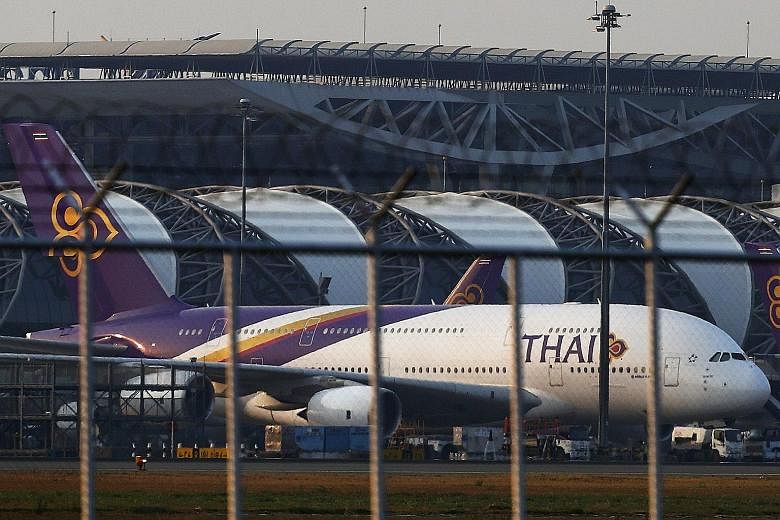Thailand's aviation sector is already reeling from a safety downgrade by the global civil aviation authority. Now it has run into more turbulence. While a key domestic airline was forced to cancel several flights over the past fortnight, international airline operators recently slammed Bangkok's Suvarnabhumi Airport for substandard facilities.
Amid the bad news, Asean's second-largest economy is steadily overhauling its aviation industry and officials say they expect to see clear results by the end of the year.
The newly established Civil Aviation Authority of Thailand (CAAT) will then ask for an audit by the International Civil Aviation Organisation (ICAO), says its acting director Chula Sukmanop.
"But before asking them to come, we have to make sure that we are good enough," he said.
The Thai aviation sector was red-flagged by the ICAO last year for lapses in its regulatory standards, triggering closer scrutiny from national aviation authorities around the world. Thai carriers are now unable to add more flights or open new routes in the United States, Japan or South Korea.
The ICAO said that Thailand had kept it informed of corrective action it had taken since the downgrade.
-
Wings clipped amid 'sinking' sensation
-
• The country's aviation sector was red-flagged by the International Civil Aviation Organisation last year for its regulatory standards.
• Thai carriers are now disallowed from adding more flights or opening new routes in the United States, Japan and South Korea.
• Budget airline Nok Air cancelled several flights in the past fortnight, leaving more than 1,000 passengers stranded on Valentine's Day. A former employee also claimed that the airline had used trainees to fly its planes due to a shortage of pilots.
• Suvarnabhumi Airport was rapped by the airline body, the International Air Transport Association, for "soft spots" on the tarmac and taxiways caused by sub-standard materials.
Dr Chula said one of the key concerns raised by the ICAO was the qualifications of inspectors. Because of a shortage of staff, inspectors who were qualified to check only one make of aircraft were assigned to other planes as well.
To fix this problem, the CAAT has hired about four times as many inspectors as it had previously. It has also set clearer, more measurable criteria in its airline regulation standards and outlined follow-up inspection schedules for airlines that have obtained their air operator certificates.
From June, the regulator will begin inspecting all 41 local airlines in a bid to re-issue their air operator certificates. Of that number, 28 carriers that ply international routes will be re-examined before the end of the year.
Meanwhile, budget airline Nok Air, which formed a joint venture with Singapore Airlines subsidiary Scoot two years ago, has been getting flak after management problems forced it to cancel several flights over the past fortnight.
When more than 1,000 passengers were left stranded by an abrupt cancellation on Valentine's Day, its chief executive pointed the finger at pilots unhappy that they did not pass a new aviation management audit based on European standards.
A pilot who was later sacked told Thai media that it was the executives who had failed to manage the shortage of pilots. He even alleged that trainees were used as pilots - a claim the airline denied.
At Suvarnabhumi, the main gateway to the country, the airport's manager has been busy addressing safety concerns.
The International Air Transport Association (IATA) - which represents airlines all over the world - had complained about "soft spots" on the tarmac and taxiways as well as the apron area caused by sub-standard materials.
"Literally, nothing less than a 'concrete' solution will do," IATA chief executive officer Tony Tyler said last week in Bangkok.
Airport general manager Sirote Duangratana said his team had been aware of the issue for some time and had a plan to tackle it.
The problem spots were caused by excessive underground water and the softening of asphalt overlaid on taxiways, he said. Drainage works to reduce the water levels have been under way since 2014, while 2.58 billion baht (S$101 million) has been earmarked for a project to concrete over the soft spots. In the meantime, contractors were resurfacing the spots with high- quality asphalt, he said.
Dr Chula acknowledged that the recent troubles might have affected the reputation of Thailand as an aviation hub. "There's been news on air transport every day for the last two weeks, but all bad news," he said. "But it's good that people are now considering this issue."
The scrutiny would only force the aviation sector to buck up.
"Those involved must be careful," he said. "It's unlike in the past when nobody cared, you could do anything… you could sweep things under the carpet."

